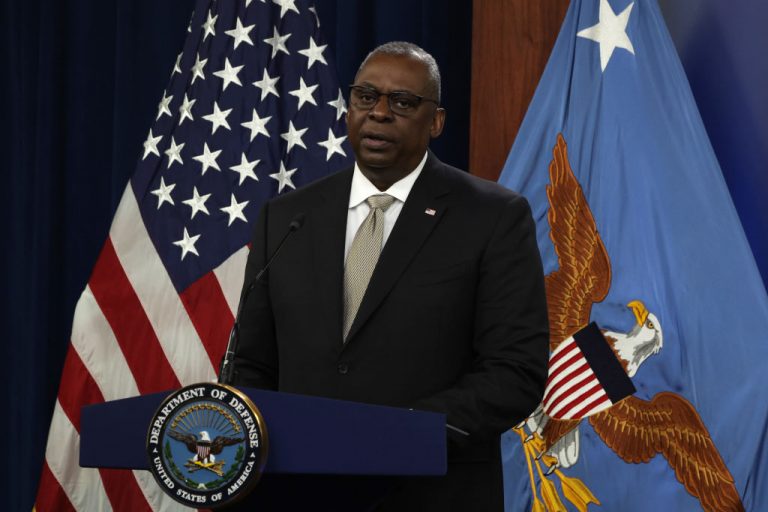In their first face-to-face meeting since the pandemic, U.S. and Chinese military chiefs sparred over the issue of Taiwan during a meeting on Friday, June 10.
The spat took place during a major defense summit at the Shangri-La Dialogue in Singapore, with Washington slamming Beijing for trying to “shift the status quo” over the self-ruling island, and Beijing claiming Washington is “fueling instability” with its actions — which have included tactical training and arms sales to Taipei.
According to an unnamed U.S official, discussions over the Taiwan issue “took up the bulk of the meeting” between U.S. Defense Secretary Lloyd Austin and his Chinese counterpart Gen. Wei Fenghe.
RELATED:
- Taiwan Air Force Jet Makes ‘Hard Landing’ in Hawaii After Aircraft Malfunction
- Taiwan Moves to Fill Chinese-language Instruction Gap Left by Beijing’s ‘Confucius Institutes’ in Europe
- Now Banned in Hong Kong, Vigil Honoring Victims of Tiananmen to Be Moved to Taiwan
- Biden: US Would Get ‘Involved Militarily’ to Defend Taiwan From Attack, But Washington’s Strategic Ambiguity of China Continues
Taiwan, officially known as the Republic of China (ROC), once governed all of China before being forced off the mainland by communist rebels, who founded the People’s Republic of China (PRC) in 1949.
‘One China’
The Chinese Communist Party (CCP) does not recognize either the ROC or an independent Taiwan, insisting that any country wishing to pursue diplomatic relations with it must first break official ties with Taipei under its One-China principle. This law, in addition to Taiwan’s expulsion from the United Nations in 1979, has resulted in the island being isolated from the global community.
Success
You are now signed up for our newsletter
Success
Check your email to complete sign up
Since Beijing views Taiwan as a renegade province and rightful part of its territory, it has used violent rhetoric and threats in vowing to reclaim the self-ruling island by any means necessary — even going as far as threatening to use military action in achieving this reunification.
The U.S. is committed to its One-China policy, Austin told Wei during the meeting, but warned that China’s People’s Liberation Army (PLA) has become “increasingly aggressive, unsafe, and unprofessional in the region.”
In recent months, the PLA has sent hundreds of sorties near Taiwan’s airspace, while undertaking various drills to simulate an invasion of the island. Foreign governments have recently also complained of “reckless flying” by Chinese fighter jets, claiming these incidents have endangered the lives of their crews during military surveillance operations.
- Australia Accuses Chinese Jet of Intercepting Its Surveillance Plane and Endangering Crew
- More US Ship-shaped Targets Appear in Chinese Desert: Satellite Images
- Canada Slams China for ‘Harassing’ Its Patrol Aircraft
- In Largest Sortie of the New Year, PLA Sends 39 Jets to Threaten Taiwan
On May 23, during a meeting with Japanese Prime Minister Fumio Kishida, U.S. President Joe Biden said that if Beijing were to launch an attack against Taiwan, the United States would intervene “militarily” and come to the self-ruling island’s defense.
After that speech, however, the White House walked back Biden’s comments, stating that they don’t reflect a change in U.S. policy regarding Taiwan. Biden’s remarks marked the third time in recent months that the president said the U.S. would protect Taiwan from a mainland attack, only to have the White House walk back those comments.
Though Washington does not recognize Taiwan as a state under international laws, it has continued to maintain informal relations with the ROC, and has provided the island with defensive weapons and training under the Taiwan Relations Act (TRA) enacted in 1979.
Disputed waters
“Secretary Austin also raised concerns about … statements by PLA officials that the Taiwan Strait is not international waters. [People’s Republic of China] officials have said that multiple times to the United States over the last several months and that’s deeply concerning,” a U.S. official told CNN following the meeting.
Mainland China’s growing economy in the late 1990s and early 2000s has enabled a major expansion of its military influence in the Asia-Pacific region.
Although the PRC regime claims its expanding military prowess is only seeking to “defend its territory,” it also holds practical control over islands claimed by Japan in the East China Sea and by Taiwan and Vietnam in the South China Sea. These disputed waters are home to vital shipping lanes and natural resources that affect the global supply chain, and have been a significant source of tension between China and its regional neighbors, as well as with the U.S.
While reacting specifically to the U.S. official’s statements in a post-meeting briefing regarding the disputed waters, a PRC military spokesman said it wasn’t Beijing that was “upsetting a decades-long policy that has provided stability across the Taiwan Strait.”
“It is not the mainland that is changing the status quo, it is Taiwan independence forces … and outside forces that are trying to change the status quo,” Senior PLA Colonel Wu Qian told reporters in a news conference after the meeting.
A statement released after the press briefing said Wu pointed specifically to a recently announced U.S. deal with Taiwan worth $120 million in arms sale to the island. The new arms sale will cover “spare parts for naval ships and related technical assistance,” Taiwan’s Defense Ministry said on June 9.
“The US again announced arms sales to Taiwan, which has seriously undermined China’s sovereignty and security interests. China firmly opposes this and strongly condemns it,” Wu said.














